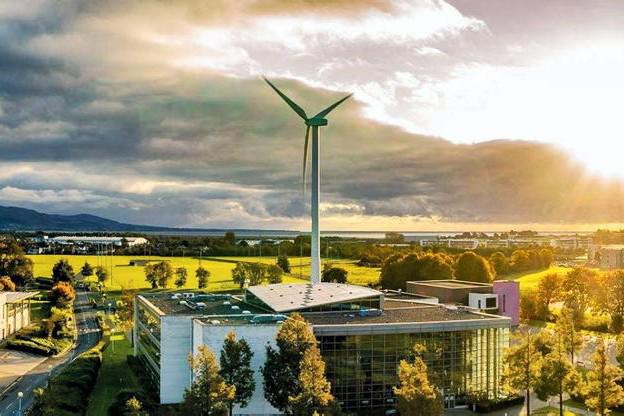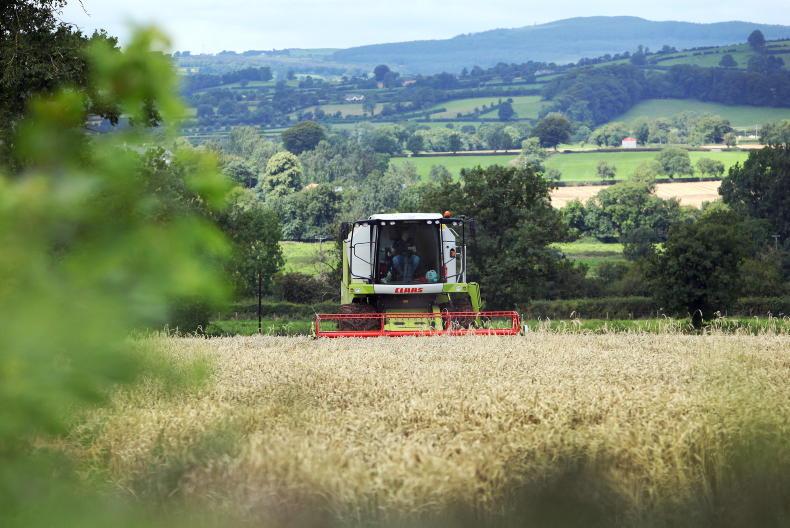Whether it is selling livestock in a busy cattle mart ring or working on property sales, auctioneers play a vital role in the agriculture sector by being the link between buyers and sellers. They are responsible for creating a transparent marketplace where a fair market value is determined through competitive bidding.
Auctioneers ensure sellers achieve the best possible prices for their goods in line with the value of the product being sold. Their expertise in agricultural markets helps optimise timing and sales strategies, making them indispensable in driving the rural economy and supporting agricultural trade.
With the changing landscape of livestock and property sales, it can be a challenging area to work in, but opportunities do exist with beef prices at a high and property at a premium. At the same time, there are a lot of young people exploring auctioneering as a career.
The average salary range for an auctioneer is between €29,275 and €62,820, according to Economic Research Institute (ERI). The economic organisation states that the average pay for an auctioneer is €50,825 a year and €24 an hour in Ireland.
There are many different pathways into auctioneering, some people go into full-time education which would be quite common, while others study it on a part-time course basis.
The certificate in auctioneering and estate agency is a two-year full-time course that focuses on the valuation and sale of residential property. Those who achieve the required standards at the certificate level may progress to the diploma - one extra year of study.
The Institute of Professional Auctioneers and Valuers, in partnership with Irish Co-operative Organisation Society (ICOS) and TU Dublin Tallaght, offers the delivery of a special award that satisfies the requirements of the Property Services Regulatory Authority (PSRA) for the A licence only.
Graduates who have completed the Teagasc level 6 green cert and are working for a mart which is a member of ICOS are eligible to apply for this award based on their qualifications.
Degree pathways include a BSc in Auctioneering, Valuation and Estate Agency (TU731) or BSc (Hons) in Property Economics (TU836) Technological University of Dublin. Along with a BSc (Hons) in Quantity Surveying (SE704) from the South East Technological University.
In Ireland, the Property Services Regulatory Authority (PSRA) issues licences for property auctioneers. Minimum requirements include education, qualifications, or relevant experience. Auctioneers must also provide a tax clearance certificate, professional indemnity insurance, and an accountant’s report. Additionally, they must pay a fee to the Property Services Compensation Fund and a licence fee, which varies based on their role.
Auctioneering regulations
Auctioneers, estate agents, letting agents and property management agents must be licensed and regulated by the authority. This applies to property located in the Republic of Ireland and to transactions in Ireland which relate to property located abroad.
You can apply for your licence online from the PRSA licensing office. Some auctioneers also require additional registration. For instance, livestock auctioneers register with the Department of Agriculture, Food and the Marine. Auctioneers provide services only for the items their licence covers.
Licence categories include:
Type A: For auctioning items other than land (eg, machinery and animals).Type B: For purchasing or selling land,including buildings.Type C: For letting land, including buildings.Type D: For property management services.George Candler: Kilkenny
Co-Op Livestock Mart
Originally from Roscommon, George Candler has over 50 years of experience as an auctioneer. During his time holding the hammer, he has seen significant changes in the ring. A big one is the decline in the number of animals at cattle sales and advancements in marking of livestock.
“My dad was the founding chairman of Roscommon Mart in 1959, which is how I got involved during my holidays. Auctioneering was relatively new then, but I thought I might have a chance at this. The numbers in marts were mega with more smaller farmers bringing livestock,” he says.
Moving to Kilkenny as a trainee auctioneer in 1972, George intended on going back to Roscommon to farm because he was the only son. He never got back, however, and has remained in Kilkenny Mart since.
He wasn’t always confident in the ring, George recalls, remembering his very first time selling.
You need to know your cattle, your customer, the buyer and seller and know if it is a good or poor animal because in the moment you have seconds to decide what the animal is worth.
“I got up to sell this calf and I thought I was selling the calf for 20 minutes and the seller of the calf was giving out asking why they let this young lad up there. But it turns out he got a good price for it.
“He came up to me 20 years later reminding me his calf was the first I sold,” says George.
It is difficult to make money in the running of livestock marts at present, according to George, given the amount of overhead costs, fees and less animals coming into the ring. He attributes part of that difficulty to the “decline of the suckler herd”.
At the same time, the livestock price is high, and George has never seen animals as dear.
In relation to the future, he says, “It’s going to be dictated by supply and demand which I feel is not beneficial to marts, if you don’t have the numbers, you won’t attract the buyers.”
When George got into auctioneering there was no actual qualification, he studied under Alexis FitzGerald.
“You need to know your cattle, your customer, the buyer and seller and you want to know if it is a good or poor animal because in the moment you have seconds to decide what the animal is worth. It was a different ballgame,” he says.
George got into pedigree sales which is different to the norm as you’re looking at higher prices along with buyers coming in from Scotland or Germany.
There was never a Monday when George was dreading going to work. He continues doing three sales a week which ‘keeps the head active’.
Ciaran Hennessy: Hennessy Auctioneers, Portlaoise

Ciaran Hennessy from Hennessy Auctioneers in Portlaoise, Co Laois.
With his family’s long-standing involvement in the auction business, it was inevitable that Ciaran would be interested in auctioneering being around the sales ring from a young age.
“I grew up around auctioneers, my grandfather bought the cattle mart in Portlaoise back in the 80s. That closed down in the early 90s around the time of foot and mouth.
“My father got involved in the business and when the cattle mart closed, we started doing machinery auctions with property, trading under the name Hennessy Auctioneers,” he says.
With a strong interest in numbers and business, Ciaran went on to study business and law at UCD, while spending every weekend helping out at the auctions and on his family’s beef and tillage farm in Stradbally.
After college Ciaran became a chartered accountant and worked in KPMG for five years. Staying in the agri-food space he worked as an accountant with Ornua before moving to ABP.
He joined the family business full-time in 2021, looking after the machinery auctions. His father John and his wife Olive manage the property side of the business. The business sells an average of 500 acres of land annually and 5,000 acres of leases.
My father got involved in the business and when the cattle mart closed, we started doing machinery auctions with property, trading under the name Hennessy Auctioneers
With a neighbour retiring down the road, Ciaran is leasing his farm after getting his green cert in Gurteen Agricultural College during COVID-19. This enabled Ciaran to do a top-up course in IPAV to obtain his A category licence, which means he can sell livestock, machinery and horses.
“I can assist from an administration point of view but I can’t legally sell the property. That’s why I look after the machinery side of things. It was a straightforward course, and in time, I can go on to get my other licence but that would mean further education and at the moment I am too busy,” explains Ciaran.
Online auctions have revolutionised the machinery and livestock trade as people are now able to access sales from the comfort of their homes.
In terms of opportunities for young people, Ciaran says auctioneering has become an attractive career for those interested in dealing with people.
“With the buying and selling, there’s a serious buzz off it. There’s not a large number of jobs in it which is a challenge. They are limited but there are a lot of auctioneers getting older which will bring opportunities [in the future],” Ciaran predicts.
Whether it is selling livestock in a busy cattle mart ring or working on property sales, auctioneers play a vital role in the agriculture sector by being the link between buyers and sellers. They are responsible for creating a transparent marketplace where a fair market value is determined through competitive bidding.
Auctioneers ensure sellers achieve the best possible prices for their goods in line with the value of the product being sold. Their expertise in agricultural markets helps optimise timing and sales strategies, making them indispensable in driving the rural economy and supporting agricultural trade.
With the changing landscape of livestock and property sales, it can be a challenging area to work in, but opportunities do exist with beef prices at a high and property at a premium. At the same time, there are a lot of young people exploring auctioneering as a career.
The average salary range for an auctioneer is between €29,275 and €62,820, according to Economic Research Institute (ERI). The economic organisation states that the average pay for an auctioneer is €50,825 a year and €24 an hour in Ireland.
There are many different pathways into auctioneering, some people go into full-time education which would be quite common, while others study it on a part-time course basis.
The certificate in auctioneering and estate agency is a two-year full-time course that focuses on the valuation and sale of residential property. Those who achieve the required standards at the certificate level may progress to the diploma - one extra year of study.
The Institute of Professional Auctioneers and Valuers, in partnership with Irish Co-operative Organisation Society (ICOS) and TU Dublin Tallaght, offers the delivery of a special award that satisfies the requirements of the Property Services Regulatory Authority (PSRA) for the A licence only.
Graduates who have completed the Teagasc level 6 green cert and are working for a mart which is a member of ICOS are eligible to apply for this award based on their qualifications.
Degree pathways include a BSc in Auctioneering, Valuation and Estate Agency (TU731) or BSc (Hons) in Property Economics (TU836) Technological University of Dublin. Along with a BSc (Hons) in Quantity Surveying (SE704) from the South East Technological University.
In Ireland, the Property Services Regulatory Authority (PSRA) issues licences for property auctioneers. Minimum requirements include education, qualifications, or relevant experience. Auctioneers must also provide a tax clearance certificate, professional indemnity insurance, and an accountant’s report. Additionally, they must pay a fee to the Property Services Compensation Fund and a licence fee, which varies based on their role.
Auctioneering regulations
Auctioneers, estate agents, letting agents and property management agents must be licensed and regulated by the authority. This applies to property located in the Republic of Ireland and to transactions in Ireland which relate to property located abroad.
You can apply for your licence online from the PRSA licensing office. Some auctioneers also require additional registration. For instance, livestock auctioneers register with the Department of Agriculture, Food and the Marine. Auctioneers provide services only for the items their licence covers.
Licence categories include:
Type A: For auctioning items other than land (eg, machinery and animals).Type B: For purchasing or selling land,including buildings.Type C: For letting land, including buildings.Type D: For property management services.George Candler: Kilkenny
Co-Op Livestock Mart
Originally from Roscommon, George Candler has over 50 years of experience as an auctioneer. During his time holding the hammer, he has seen significant changes in the ring. A big one is the decline in the number of animals at cattle sales and advancements in marking of livestock.
“My dad was the founding chairman of Roscommon Mart in 1959, which is how I got involved during my holidays. Auctioneering was relatively new then, but I thought I might have a chance at this. The numbers in marts were mega with more smaller farmers bringing livestock,” he says.
Moving to Kilkenny as a trainee auctioneer in 1972, George intended on going back to Roscommon to farm because he was the only son. He never got back, however, and has remained in Kilkenny Mart since.
He wasn’t always confident in the ring, George recalls, remembering his very first time selling.
You need to know your cattle, your customer, the buyer and seller and know if it is a good or poor animal because in the moment you have seconds to decide what the animal is worth.
“I got up to sell this calf and I thought I was selling the calf for 20 minutes and the seller of the calf was giving out asking why they let this young lad up there. But it turns out he got a good price for it.
“He came up to me 20 years later reminding me his calf was the first I sold,” says George.
It is difficult to make money in the running of livestock marts at present, according to George, given the amount of overhead costs, fees and less animals coming into the ring. He attributes part of that difficulty to the “decline of the suckler herd”.
At the same time, the livestock price is high, and George has never seen animals as dear.
In relation to the future, he says, “It’s going to be dictated by supply and demand which I feel is not beneficial to marts, if you don’t have the numbers, you won’t attract the buyers.”
When George got into auctioneering there was no actual qualification, he studied under Alexis FitzGerald.
“You need to know your cattle, your customer, the buyer and seller and you want to know if it is a good or poor animal because in the moment you have seconds to decide what the animal is worth. It was a different ballgame,” he says.
George got into pedigree sales which is different to the norm as you’re looking at higher prices along with buyers coming in from Scotland or Germany.
There was never a Monday when George was dreading going to work. He continues doing three sales a week which ‘keeps the head active’.
Ciaran Hennessy: Hennessy Auctioneers, Portlaoise

Ciaran Hennessy from Hennessy Auctioneers in Portlaoise, Co Laois.
With his family’s long-standing involvement in the auction business, it was inevitable that Ciaran would be interested in auctioneering being around the sales ring from a young age.
“I grew up around auctioneers, my grandfather bought the cattle mart in Portlaoise back in the 80s. That closed down in the early 90s around the time of foot and mouth.
“My father got involved in the business and when the cattle mart closed, we started doing machinery auctions with property, trading under the name Hennessy Auctioneers,” he says.
With a strong interest in numbers and business, Ciaran went on to study business and law at UCD, while spending every weekend helping out at the auctions and on his family’s beef and tillage farm in Stradbally.
After college Ciaran became a chartered accountant and worked in KPMG for five years. Staying in the agri-food space he worked as an accountant with Ornua before moving to ABP.
He joined the family business full-time in 2021, looking after the machinery auctions. His father John and his wife Olive manage the property side of the business. The business sells an average of 500 acres of land annually and 5,000 acres of leases.
My father got involved in the business and when the cattle mart closed, we started doing machinery auctions with property, trading under the name Hennessy Auctioneers
With a neighbour retiring down the road, Ciaran is leasing his farm after getting his green cert in Gurteen Agricultural College during COVID-19. This enabled Ciaran to do a top-up course in IPAV to obtain his A category licence, which means he can sell livestock, machinery and horses.
“I can assist from an administration point of view but I can’t legally sell the property. That’s why I look after the machinery side of things. It was a straightforward course, and in time, I can go on to get my other licence but that would mean further education and at the moment I am too busy,” explains Ciaran.
Online auctions have revolutionised the machinery and livestock trade as people are now able to access sales from the comfort of their homes.
In terms of opportunities for young people, Ciaran says auctioneering has become an attractive career for those interested in dealing with people.
“With the buying and selling, there’s a serious buzz off it. There’s not a large number of jobs in it which is a challenge. They are limited but there are a lot of auctioneers getting older which will bring opportunities [in the future],” Ciaran predicts.










SHARING OPTIONS